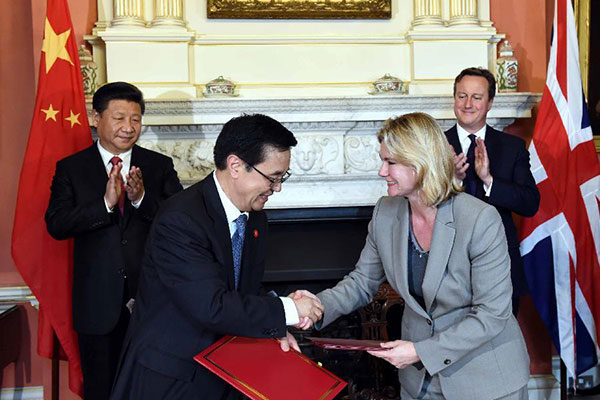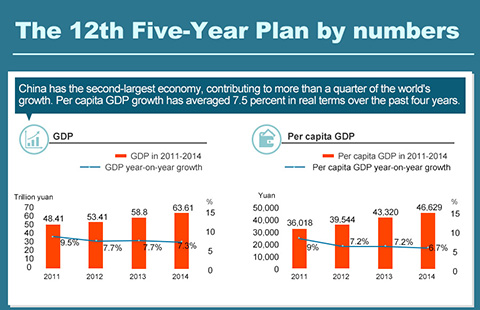Fruitful China-Britain energy cooperation sets model for global climate battle
(Xinhua) Updated: 2015-10-27 14:08
|
 |
|
Chinese President Xi Jinping (L, back) and British Prime Minister David Cameron (R, back) attend a signing ceremony of bilateral cooperation documents after their talks at 10 Downing Street in London, Britain, Oct 21, 2015. [Photo/Xinhua] |
The infrastructure mega-project, in which a Chinese consortium holds a 33.5 percent stake under a deal signed in London at the presence of visiting Chinese President Xi Jinping and British Prime Minister David Cameron, epitomizes the close cooperation between the two countries in the energy sector.
And the latest example of the ever deepening and diversified China-Britain energy cooperation, which features an increasing share of clean power resources, also gives body to their shared resolve to combat the common threat of climate change.
Historic flagship project
Located in southwestern England with an estimated construction cost of 18 billion pounds ($28 billion), Hinkley Point C is now expected to start operating in 2025 with a 3.3-gigawatt total capacity, larger than the output of any existing single plant in Britain.
Xi hailed the enterprise as a flagship project of China-Britain cooperation, while Cameron called the investment deal "historic." It marks the first time for Chinese companies to participate in civil nuclear projects in Europe.
Both countries stand to benefit from the deal. For China, it unlocks the potential for Chinese firms to play a bigger role in Britain's energy market and for China to export its nuclear technologies and equipment to other parts of the world. For Britain, it heralds a rejuvenation of the country's aging nuclear power system with Chinese investment -- and more jobs.
Vincent de Rivaz, CEO of EDF Energy, the British affiliation to French power giant EDF and the senior partner in the Hinkley Point C project, noted that the deal marks the "biggest inward investment in British history" with the creation of up to 25,000 jobs during the plant's construction.
"I accept that not everyone is persuaded that it is a good thing," he said, while stressing that he is convinced the project "is an industrial opportunity with benefits reaching far beyond a single nuclear power station in Somerset."
Diversified energy cooperation
Nuclear cooperation, meanwhile, is not all in the bilateral energy cooperation portfolio. In line with the global trend of curbing pollutants emissions and pursuing low-carbon development, China and Britain have also been steering their energy cooperation towards clean and renewable resources.
The two sides have in recent years signed massive business deals on natural gas, carried out fruitful cooperation in solar and wind power, and pioneered in exploring tidal wave power generation.
- 'Golden time' approaching for Chinese students in Britain to start business
- Top 10 degrees that provide highest paid jobs in UK
- Belt and Road helps China become net capital exporter: Report
- China, Britain strengthen cooperation to push yuan's global use
- China, Britain raise curtain of 'golden time' in ties with $60b deals
- Fruitful China-Britain energy cooperation sets model for global climate battle
- They live in Russia, but shop in China
- China, S.Korea, Japan to hold commerce ministers' meeting in over 3 years
- JD.com and Tencent expect big numbers in Nov 11 e-shopping event
- China's unemployment rate slightly up
- China's Sept industrial profits narrow decline
- Silk Road Fund to invest $100m in Chinese company's IPO
- REX set to take control of Yota with $100m deal














